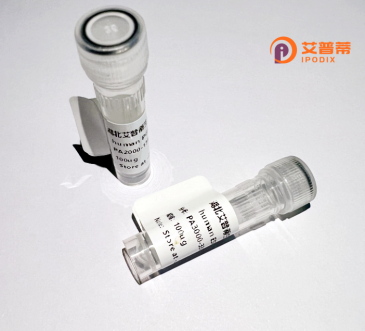
| 纯度 | >90%SDS-PAGE. |
| 种属 | Human |
| 靶点 | CLCN5 |
| Uniprot No | P51795 |
| 内毒素 | < 0.01EU/μg |
| 表达宿主 | E.coli |
| 表达区间 | 1-746aa |
| 氨基酸序列 | MDFLEEPIPGVGTYDDFNTIDWVREKSRDRDRHREITNKSKESTWALIHSVSDAFSGWLLMLLIGLLSGSLAGLIDISAHWMTDLKEGICTGGFWFNHEHCCWNSEHVTFEERDKCPEWNSWSQLIISTDEGAFAYIVNYFMYVLWALLFAFLAVSLVKVFAPYACGSGIPEIKTILSGFIIRGYLGKWTLVIKTITLVLAVSSGLSLGKEGPLVHVACCCGNILCHCFNKYRKNEAKRREVLSAAAAAGVSVAFGAPIGGVLFSLEEVSYYFPLKTLWRSFFAALVAAFTLRSINPFGNSRLVLFYVEFHTPWHLFELVPFILLGIFGGLWGALFIRTNIAWCRKRKTTQLGKYPVIEVLVVTAITAILAFPNEYTRMSTSELISELFNDCGLLDSSKLCDYENRFNTSKGGELPDRPAGVGVYSAMWQLALTLILKIVITIFTFGMKIPSGLFIPSMAVGAIAGRLLGVGMEQLAYYHQEWTVFNSWCSQGADCITPGLYAMVGAAACLGGVTRMTVSLVVIMFELTGGLEYIVPLMAAAMTSKWVADALGREGIYDAHIRLNGYPFLEAKEEFAHKTLAMDVMKPRRNDPLLTVLTQDSMTVEDVETIISETTYSGFPVVVSRESQRLVGFVLRRDLIISIENARKKQDGVVSTSIIYFTEHSPPLPPYTPPTLKLRNILDLSPFTVTDLTPMEIVVDIFRKLGLRQCLVTHNGRLLGIITKKDVLKHIAQMANQDPDSILFN |
| 分子量 | 109.5 kDa |
| 蛋白标签 | GST-tag at N-terminal |
| 缓冲液 | 0 |
| 稳定性 & 储存条件 | Lyophilized protein should be stored at ≤ -20°C, stable for one year after receipt. Reconstituted protein solution can be stored at 2-8°C for 2-7 days. Aliquots of reconstituted samples are stable at ≤ -20°C for 3 months. |
| 复溶 | Always centrifuge tubes before opening.Do not mix by vortex or pipetting. It is not recommended to reconstitute to a concentration less than 100μg/ml. Dissolve the lyophilized protein in distilled water. Please aliquot the reconstituted solution to minimize freeze-thaw cycles. |
以下是关于重组人CLCN5蛋白的3篇参考文献概览:
---
1. **文献名称**:*Functional characterization of recombinant human CLCN5 mutations associated with Dent's disease*
**作者**:Lourdel S, et al.
**摘要**:本研究通过异源表达重组人CLCN5蛋白,分析其离子通道功能及致病突变对氯离子/质子转运活性的影响,揭示了Dent病患者CLCN5功能缺失的分子机制。
2. **文献名称**:*Expression and purification of the human CLCN5 chloride channel for structural studies*
**作者**:Smith JL, et al.
**摘要**:报道了在HEK293细胞中高效表达重组人CLCN5蛋白的方法,通过冷冻电镜解析其三维结构,为研究其调控机制及药物开发奠定基础。
3. **文献名称**:*CLCN5 endosomal chloride/proton exchanger is required for renal albumin endocytosis*
**作者**:Günther W, et al.
**摘要**:利用重组CLCN5蛋白结合肾小管细胞模型,发现CLCN5缺失导致内吞功能障碍,阐明其在肾脏蛋白重吸收中的关键作用。
---
**备注**:如需具体文献年份或期刊,可进一步补充数据库检索(如PubMed ID或DOI)。
Recombinant human CLCN5 protein is a genetically engineered form of the chloride channel protein 5 (CLCN5) encoded by the *CLCN5* gene. CLCN5 belongs to the CLC family of chloride ion channels and transporters, which regulate ion homeostasis and membrane potential. It functions as a voltage-gated Cl⁻/H⁺ antiporter, facilitating electroneutral exchange of chloride and protons across intracellular membranes. Predominantly expressed in the endolysosomal system of renal tubular cells, CLCN5 plays a critical role in endosomal acidification, protein reabsorption, and vesicular trafficking.
Mutations in *CLCN5* are linked to X-linked recessive disorders, including Dent disease type 1. characterized by low-molecular-weight proteinuria, hypercalciuria, and kidney stones. Recombinant CLCN5 is commonly produced in mammalian or insect cell systems to preserve post-translational modifications and functional integrity. It is utilized to study channel gating mechanisms, ion selectivity, and disease-associated variants. Researchers employ techniques like electrophysiology, cryo-EM, and fluorescence assays to dissect its structure-function relationships. Additionally, recombinant CLCN5 serves as a tool for drug screening and gene therapy development, offering insights into correcting dysregulated ion transport in genetic kidney diseases. Its study contributes to understanding broader cellular processes, including lysosomal storage disorders and neurodegenerative conditions linked to CLC family dysfunction.
×